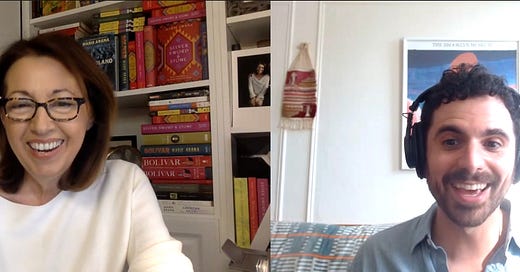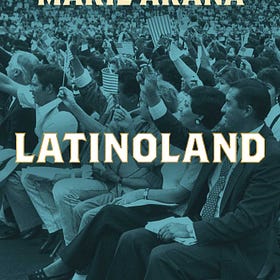As conversations about Latino voters heat up, I spoke with Marie Arana about her book, LatinoLand: A Portrait of America's Largest and Least Understood Minority. Marie details the centrality of Latinos to the economy, how Republicans are making inroads courting Latino communities, and how the “government has often treated Latinos as an afterthought.”
Marie is a Peruvian-American author and the inaugural Literary Director of the Library of Congress. A condensed transcript of our conversation, edited for clarity, is below. You can also listen to the audio, which includes Marie’s take on the term Latinx, how “whiteness” could be bought in the Spanish empire, how “staying” is “the crux of the Latino immigrant’s dilemma,” and more:
Correcting the Invisibility of LatinoLand
Listen now (34 mins) | Audio of my conversation with Marie.
Ben: I'd like to start with a quote of yours: “No one calls us Native Americans, for we do not belong to tribes... and only a tiny percentage of our ranks checks that box on the census, but if our DNA tells us anything, it is an ancestry many of us can claim.” What do you mean?
MA: Well, as children of the conquest, Latinos can trace our identity back to an unprecedented mixing of races in this hemisphere. When Europeans arrived in the so-called New World—actually a well-established and ancient world—they came without women, leading to immediate racial mixing with the Indigenous populations.
Spain itself had been occupied by the Arab Caliphate for 800 years. So, when Europeans arrived in Latin America, they brought with them a version of Europe already enriched by African and Arab influences. We are, as I often say, a grand experiment, now sort of taking over the world.
Ben: A world that, in the States at least, Latinos have long inhabited.
MA: That’s right. Spanish colonial Mexico once extended from the Rio Grande up to Wyoming and from California to Kansas, and Indigenous Mexicans were spread out before then. So the Mexican part of America has been here all along.
Ben: It’s a little like if aliens took over the earth and several generations later asked what planet we come from. Um... earth?
MA: Ha, exactly. The notion that Latinos are newcomers is fundamentally flawed.
Ben: You also document the many labels given to a large group of people.
MA: Yes, it’s a fascinating history. When Napoleon invaded Spain in the early 19th century, he saw an opportunity to take over the Spanish Empire. To justify consolidating Spain’s colonies, France launched a diplomatic effort to say, well, we may seem different but we’re all of Latin blood. Thus, "Latin" became a term to describe us, leading to the use of "Latino" or "Latina" in our self-identification, and the term "América Latina.”
Much later, in the 1970s, Richard Nixon, during his re-election campaign, noticed that Latinos—then often referred to as Mexican Americans or similar terms—weren't supporting him. Nixon, familiar with the Latino community from his time in California, made a concerted effort to court them. Hispanic Heritage Month and Hispanic Heritage Day were his babies. And in the process the term "Hispanic" gained prominence and became another label by which we identify ourselves today.
Ben: I’m glad that Richard Nixon isn’t hearing us connect him to Napoleon, lest his ego get more inflated.
As you’re alluding though, a lot of this history is dynamic—a lot of it is even changing right now. In one example, you discuss the Catholic Church's power throughout Latin American history, but there’s been a notable shift from Catholicism to Protestantism within Latino communities. What’s driving the change?
MA: The shift began with liberation theology, which emerged in the late 1950s and continued into the 1980s. People began to question white supremacy (much like in the Civil Rights Movement in the States), fueled by severe social injustices across Latin America. However, ensuing revolutions often led to brutal crackdowns by autocratic governments, and the Church, which had traditionally been aligned with the ruling powers, found itself at a crossroads.
Many priests, who had previously been distant from the common people, began to embrace liberation theology. They took an active role in fighting for justice, sometimes even taking up arms alongside revolutionaries, driven by the realization that the traditional methods of spreading the word of God weren’t enough. The Church grew associated with violence, particularly in places like Central America, where priests and nuns were often targeted and killed.
In its place, you began to see American missionaries, including Mormons, Evangelicals, and Pentecostals, begin to make inroads into Latin America. Their message was different: instead of promising prosperity in the afterlife, they taught that one could achieve prosperity in this life by following certain moral guidelines, like avoiding alcohol and corruption. The message resonated strongly with many Latinos, and today, we see the results. Brazil, which has been a majority Catholic country for over 500 years, is projected to be majority Protestant by 2032. Guatemala is already majority Pentecostal. In the United States, one out of four Latinos is now evangelical, which is astounding given the long history of Catholicism in these communities.
Ben: It’s incredible to think about the scale of this shift, especially considering how long these countries have been majority Catholic. It’s almost as if fish called and said they were shifting away from gills.
MA: It’s a complete change of identity. In my book, I interview Pastor Sam Rodriguez, a remarkable figure who has advised presidents from George Bush to Barack Obama to Donald Trump. He oversees 42,000 evangelical churches across the hemisphere. These evangelical churches are very different from traditional Catholic churches. They’re vibrant, with rock music, dancing, and singing.
It’s easy to see why so many Latinos are drawn to this movement. They walk out of these services feeling uplifted and proud of their identity.
Ben: And sometimes feeling rather Republican.
MA: Yes, that’s a crucial point. While the Latino electorate as a whole tends to sympathize with the Democratic Party, there’s a significant portion that isn’t registered to vote. This creates a large gap in the electorate, which Republicans have been very strategic in targeting.
Organizations like Libre, funded by the Koch Corporation, have been particularly effective. “Libre” means freedom in Spanish.
Ben: If there is a specific job where someone gets to name right-wing organizations, I want it. It seems pretty easy!
MA: Ha, yes. But Libre can mobilize across the country in a single weekend, going door to door, engaging with Latinos who haven’t been involved in the political process. They reach out to those who’ve lost faith in the system and convince them that their vote matters. The strategy has been particularly successful in evangelical communities, where religious leaders like Sam Rodriguez encourage their congregations to “vote their faith,” which often aligns with Republican values.
Ben: Libre, you note, “manages to sidestep the fact that Koch money is working to defeat any hike of the minimum wage or further implementation of the Affordable Care Act—two outcomes most Latinos want.”
At the same time, you discuss how Democrats have often taken Latinos for granted.
MA: Yes. There’s this narrative, especially within the Democratic Party, that Latinos are poor and therefore need welfare and big government. But really that’s not who we are. Latinos are a huge part of the U.S. economy. We have some of the lowest unemployment rates, and many Latinos work two or three jobs. If the Latino population were its own country, it would have the fifth-largest GDP in the world.
Still, the U.S. government has often treated Latinos as an afterthought, failing to engage with us in a meaningful way. The last U.S. president to really engage with Latinos was Richard Nixon, which is puzzling given our contributions and the size of our population—64 million strong.
My mission is to correct our invisibility.
Ben: Well, if your book is any indication, mission accomplished in my opinion.
MA: Thanks, Ben. This was such a pleasure.





